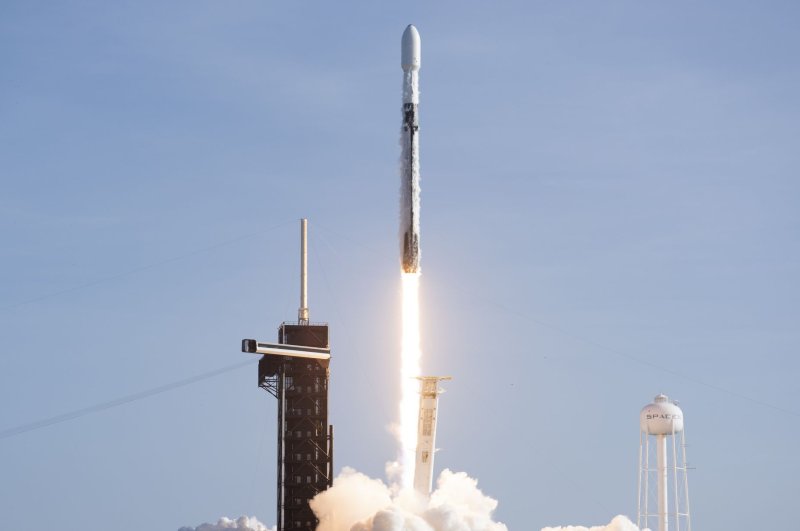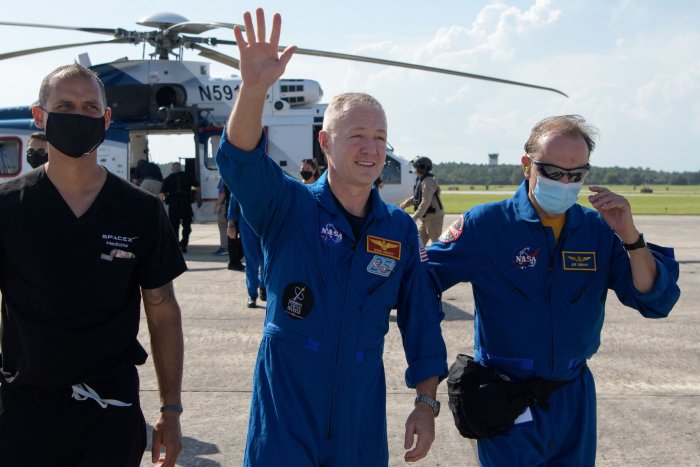1 of 3 | A SpaceX Falcon 9 rocket is launched in September from Complex 39A at Kennedy Space Center in Florida, where more frequent commercial activity has prompted consideration of a new spaceport organization. File Photo by Joe Marino/UPI |
License Photo
ORLANDO, Fla., Dec. 9 (UPI) -- The U.S. Space Force is studying the possibility of merging management of dozens of launch sites in Florida and California under a new operator to keep pace with the growing commercial space industry.
"A future spaceport authority would ideally be able to address the needs of all consumers to include national security and civil customers," said Space Force Maj. Nicholas Mercurio, public affairs adviser to chief of space operations Gen. Jay Raymond.
Reorganizing launch site management would help NASA, the military and private space companies like Elon Musk's SpaceX launch more frequently and with less bureaucratic delay.
Creating such a management organization would aid the growth of a space economy, which many banks believe will exceed $1 trillion globally by 2040, according to a study prepared for the Space Force by California-based The Aerospace Corporation, a think tank.
The study also noted that such a strategy also would help ensure that the United States remains the global leader in spaceflight.
The nation's busiest launch sites, at Cape Canaveral Air Force Station and Kennedy Space Center in Florida, are at "significant risk" of falling behind the pace of launches planned by private companies, the study said.
The Federal Aviation Administration, which issues permits for launches, expects about 50 launches in 2021 -- mostly from the Florida sites and Vandenberg Air Force Base in California -- and 100 launches per year if companies like SpaceX, Blue Origin and Virgin Galactic begin space tourism flights.
The first step creating more efficient space launches would be to form a national spaceport authority, Mercurio said. No proposed timeline for such a transition has been determined.
"We are very early in the process, but believe now is the time to start having these discussions so we can focus our future development," Mercurio said.
The federal government can "develop a parent organization to operate and maintain the spaceports," the 47-page study suggests.
"It is possible for the [Department of Defense] to remove itself from the day-to-day direct management of the [launch pads] and, instead, transfer its authorities to an entity that is solely focused on operating spaceports as its core competency," the study said.
Florida's launch locations are constrained by delays and procedural differences between the NASA sites and the Air Force sites, said the study's author, Richard E. Lamb, systems director at The Aerospace Corporation, which has provided advisory services to the federal government, particularly the Department of Defense, for decades.
For example, Lamb said, each facility has different procedures for rocket and spacecraft storage and processing, fuel processing and storage, operations centers, weather stations, data processing, security and air traffic management.
"The motivation has always been what is in the best interest of the United States and how we ... create a national conversation about evolving our national space infrastructure," he said.
Lamb noted that launch sites like Cape Canaveral Air Force Station in Florida originally were built to test missile launches, but they have evolved into property managers for private space companies. Launch pads at the Air Force station are leased to such firms as SpaceX, Blue Origin and Firefly Aerospace.
A spaceport authority could take over some management of those sites, including such famous launch pads that include Kennedy Space Center's Complex 39A, where Apollo 11 lifted off for the moon.
At the Air Force station, such sites include Landing Zone 1 and 2, where SpaceX lands rocket boosters after launch, and Launch Complex 5, the site of all six manned and unmanned Mercury/Redstone liftoffs.
Lamb's firm completed its paper, titled "A National Spaceport Strategy," in August as a starting point for talks among many federal agencies, including the Space Force, NASA and the departments of transportation and commerce.
A national effort is needed to ensure an adequate number of launch sites exist and that they have the correct facilities and technology, Lamb said.
"The closest thing we've found to compare this to is the St. Lawrence Seaway Authority and other port authorities around the world," Lamb said.
Florida has a strong interest in making sure its launch facilities stay busy, said Dale Ketcham, vice president of external relations for Florida's space development agency, Space Florida.
"We've been stating since June of 2016 that there needs to be a better governance model for a spaceport," Ketcham said. "Neither NASA nor the Space Force are chartered or equipped to manage a bunch of commercial enterprises like we are seeing."
If NASA and the Space Force aren't able to accommodate the growth of commercial space traffic, launchers may look overseas or develop their own spaceports, Ketcham said.
Eventually, a national spaceport authority could combine some facilities or services at the neighboring Florida launch sites -- Kennedy Space Center and Cape Canaveral Air Force Station, Ketcham said.
Private launch companies are watching developments closely, said Les Kovacs, vice president of business development at Firefly, based in the Austin, Texas, area. The firm intends to renovate an old launch pad at Cape Canaveral Air Force Station to launch small rockets.
"In Florida, particularly, there can be a lot of trouble preparing a site to launch again quickly after a rocket has lifted off," Kovacs said. "They've been getting better lately, but more progress is needed."
He added: "Anything they can do to standardize procedures and increase the frequency of launch would be a big help. The small launch industry will grow, and the question becomes who accommodates that best. The current structure may not be the right answer."
NASA astronaut Douglas Hurley (C) waves to onlookers as he boards a plane at Naval Air Station Pensacola to return him and NASA astronaut Robert Behnken home to Houston a few hours after the duo landed in their SpaceX Crew Dragon Endeavour spacecraft off the coast of Pensacola, Fla,, on August 2, 2020. Photo by Bill Ingalls/NASA |
License Photo
















